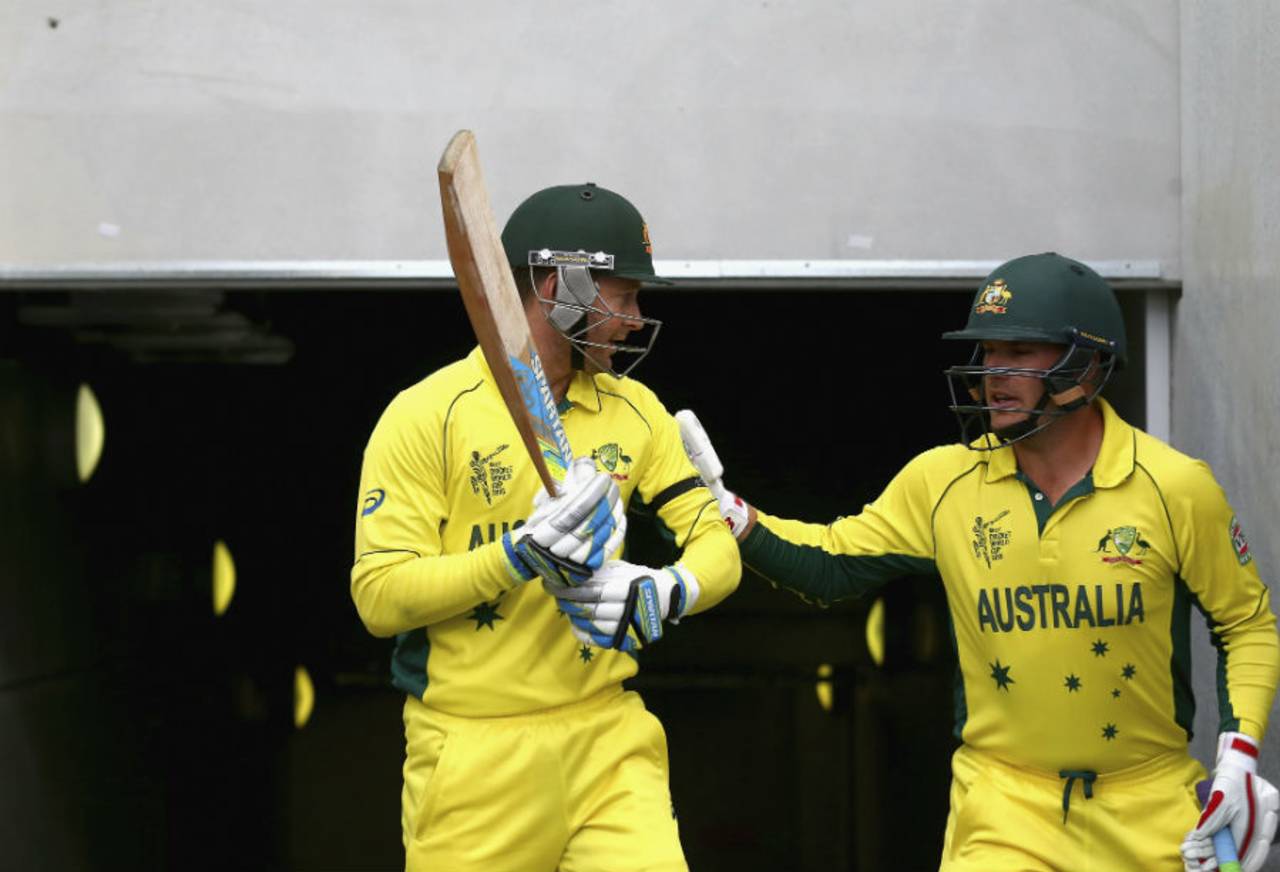Pragmatic Australia ace rain hurdle
Despite the nervousness caused by the weather, Australia's professional victory secured their preferred route for the knockouts
Brydon Coverdale in Hobart
14-Mar-2015

Michael Clarke opened the innings for the first time since 2009 in a bid to get some game time • Getty Images
At 6.02pm, the rain blew in over Bellerive Oval, the sky darkened and so did the faces of Australia's cricketers. Washed out against Bangladesh in Brisbane, surely it would not happen against Scotland too? The consequences would have been severe: finish third in their group, face South Africa in a quarter-final, take on New Zealand in Auckland in a semi-final. There are many paths to the top of the mountain, but that one would be prone to avalanche.
A nervous hour-and-a-half ensued, Australia still needing 39 runs to overhaul Scotland's total of 130. The rain eased up, the covers were removed, and then the weather turned once more. Only 13.2 overs had been bowled, 40 balls short of what is required to constitute a match and bring Duckworth-Lewis into play. When play resumed at 7.35pm, 12 balls was all David Warner and James Faulkner needed.
The overwhelming feeling amongst the Australians was relief. In their quarter-final in Adelaide they will now face the winner of Sunday's game between Pakistan and Ireland, and should they reach a semi-final it will be at home, at the SCG, against India or Bangladesh. It must certainly be their preferred side of the draw, given their success against Asian teams at home.
Australia's desperation for a fourth victory was apparent from Michael Clarke's decision to send Scotland in. Pragmatism is not always a strength of the bullish Australians, but Clarke read the forecast and sniffed the breeze. The Hobart crowd jeered his choice to bowl first, but this was not a day for a 400-plus score. This was a day to get the job done, and get it done quickly.
The first ball of the match was a bouncer from Mitchell Starc, keen to immediately put Scotland's top order on the back foot. The slip cordon stayed in place for the fast men through the whole innings. Wickets fell, the Australians moved quickly back to their positions. The drinks break was an obstacle; with time of the essence, they waited in their places for Scotland's batsmen to have a sip and return.
Eyes constantly glanced above the new Ricky Ponting Stand on the west side of the ground, nervously waiting for the rain. When it came it was light, but Ian Gould and Richard Illingworth were taking no chances. Play was suspended with Scotland eight down. The Australians dawdled, miffed by the decision. They could have played on, and probably should have. But there is no DRS for rain interruptions.
When play was set to resume, the Australians were all in their fielding positions before the umpires or the Scotland batsmen made it onto the field. They wanted a quick kill, and through Starc they got it, the last two wickets falling in four balls. Part one of their job was done, Scotland were skittled for 130 in the 26th over. Part two required beating the rain again.
But still there was a chance to ensure their second priority could be achieved as well, getting some batting time into Clarke, Shane Watson and James Faulkner. Criticised for not batting against Afghanistan in Perth, Clarke here took the opposite route: for the first time since 2009, he walked out to open in an ODI innings.
There were scratchy moments. He copped one in the groin and another in the shoulder when he missed his pulls and hooks. Watson came out at No. 3 and struck a few boundaries but was notably grumpy, bickering with Scotland bowler Rob Taylor. Clarke too had been terse at his pre-match press conference: Australia wanted this pool stage over, and over on their terms.
Their Brisbane match had seemed more like the swimming pool stage, not a ball bowled due to a deluge. In Hobart the rain was just frustrating. After Australia went off with 39 runs needed, Duckworth-Lewis calculations began. They already had the runs required for the 20-over mark, they just didn't have the 20 overs.
It was not out of the question that they could have lost overs, had the target reduced and have play nominally start but with their new target already reached. In the end, no overs were lost, just a few fingernails. After the win, Clarke was a relieved man.
"There was obviously doubt about getting a result," Clarke said. "There was rain forecast and it didn't look great. There was always a fair bit of wind so we had confidence that would continue and blow the rain away - but it could also blow rain in.
"The fact we already knew we'd qualified for a World Cup quarter-final was positive. It's just that we wanted to win this game to finish second, rather than third or fourth. That was our main focus, on making sure we did everything we could to win this game.
"I think we did whatever we could. We made the most of our opportunity. Most importantly, everyone in the squad mentally is ready to go. I still felt a little bit rusty there with the bat. I don't think Watto would've played that shot if he wasn't putting the team first, and Jimmy Faulkner came in and tried to smack it at the end there. We made the most of it. All three of us got a bat, so it's better than it could have been."
The whole day was much better than it could have been, despite the nervous moments. Australia won as comfortably as they could have under the circumstances, in only 41 overs of cricket. It was pragmatic and professional, a quick kill, if an interrupted one. Crisis averted.
Brydon Coverdale is an assistant editor at ESPNcricinfo. @brydoncoverdale